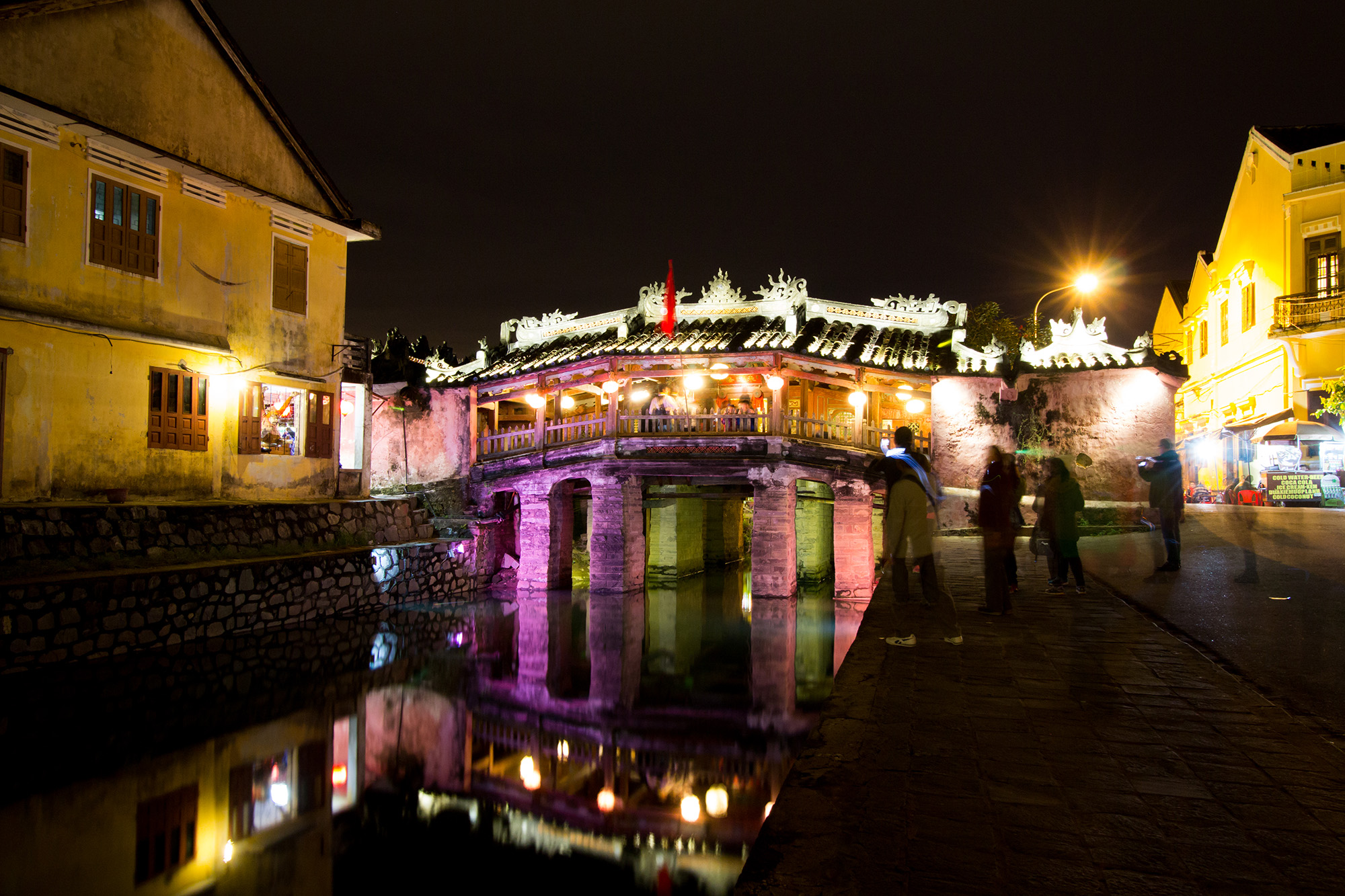As one of the most popular tourist attractions in central Vietnam, last year Hoi An welcomed over 2.2 million visitors from both Vietnam and countries all over the world; its unique charm and the well-preserved ancient trading port town make for a relaxing escape. Besides the famous ancient town, travelers also get lost in the land of vintage memories by wandering around the complex of different ancient villages where friendly locals maintain the legacy of their ancestors by crafting the same products that made their name in Vietnam’s history.

To travel is more than simply visiting a place and taking the touristy photo; traveling also encompasses learning the local way of life by understanding their history and stories. I have traveled for 4 months discovering central Vietnam. I explored with the intention to reveal the hidden charms of Vietnam, and Hoi An caught my attention. But what was really mesmerizing was the area surrounding Hoi An, the off-the-beaten-track Hoi An that many people miss. In this article, I will provide just a taste of what I found there.
Contents
Cam Kim Rural Village
Did you know that just on the other side of Hoi An city, there is an authentic Vietnamese village which remains unaffected by urbanization? No tourist lines, no bustling shops or luxury hotels, it will be just you and the beautiful rural scenery in Cam Kim, a peaceful commune village. Just pass over the bridge and you will travel back in time to fresh air, a soothing atmosphere, traditional Vietnamese wooden houses, and of course, long-standing local villages. Start with Cam Kim mat weaving village by observing the dexterous hand movements of the mat weavers. The weavers must be extremely focused to weave a perfect mat, it is difficult not to respect and admire their hard work.
Don’t leave Cam Kim without visiting Kim Bong carpentry village. You will hear this village before you see it. With the unique loud noise made from sawing and chiseling wood, you can sense it from afar! Lots of wood products are made and displayed by carpenters here and only by strolling around will you understand the process. Moreover, there are marvellous rice fields around Cam Kim which means that you can get hands-on experience in making rice paper! To sum up, when you’re here, remember to learn how to make traditional rice paper and try weaving mats with the locals!
The fun has just started. After exploring Cam Kim village, let’s take a scenic boat trip in Cam Thanh village nearby to discover the coconut forest. Immerse yourself in the lush beauty of the palm-fringed jungle and watch the local fishermen enjoy their work under the sunlight. And if you’re seeking more fun, don’t forget to try the basket boat at Rung Dua Bay Mau Ecotourism. It will be a hundred times funnier and crazier than riding a carousel, I promise! When you return to Hoi An city, it’s time to delve into the local cuisine to refuel your energy.
More information: Cam Kim Village
Google Maps location: Cam Kim Village
Tribal village in the mountain (Bho Hoong of Dong Giang rural district)
Everyone who reads about Vietnam has heard of the fairyland Sapa because it has gorgeous natural scenery and the exotic culture of local tribes. Sadly, it is obvious that this area is a tourist attraction because many people visit and therefore the local people have been exposed to the tourism industry for a long time. As a result of such circumstances, the site has become less authentic and more business oriented.
That is why this alternative guide to Bho Hoong village, the Co Tu (Ker-Too) tribe’s homeland, is valuable. A member of the big family of 54 ethnicities in Vietnam, Co Tu tribe shares some similarity in the lifestyle, customs, and the use of the bronze gong with the neighboring communities but they also preserve their unique features at the same time. Visitors will have the chance to admire the greatness of a Gươl house, Moong house, the soul keeper of the community. If you are looking for some local friends, then turn to the Cơ Tu boys and girls who are welcoming and friendly. They will be happy to show you their traditional crafting jobs, their brocade fabric weaving technique, or their T’tung, Zaza dance. Plus, they might even reveal to you their favorite hot water stream that they frequent in the cold season from December to March.
Long rides always make me hungry and it would be selfish of me not to share with you the mouth-watering-cuisine made with local produce in this region. Temperatures on the highland dip very low sometimes. In order to keep themselves warm, Co Tu people make a drink called Ta-vat, Tr’din alcohol which is made with a special kind of tree root. Many local people drink this with grilled bamboo stick rice and hot zara (sliced pork in bamboo stick) together with a variety of fresh jungle herbs. Pay special attention to the way in which the Co Tu people take care of their animals and season their food.
The journey to Bho Hoong village is just as fun as the village itself. The distance is a little long for a day trip; 77.6km to the east of Hoi An but travelers will have the chance to enjoy the beautiful ride through the shade of big trees in Ba Na – Nui Chua natural reservation area.
- Pro tip: The ride to Bho Hoong village is shady and beautiful but keep in mind that it is longer and a bit harder than the journey to Tam Thanh village. Make sure your navigating devices are charged and your gas tank is filled—I suggest filling up at every gas station you see. Viettel has the best coverage in this area. Other than that, be sure to bring along your free spirit.
Tay Giang, the deeper reach to the east
Located 51 kilometers further to the east of Dong Giang or 110 kilometers from Hoi An, Tay Giang can be made into the 2nd day option for a two-day minority cultural adventure. Despite being very similar to Dong Giang, the Co Tu inhabitants in Tay Giang, have a unique cuisine thanks to weather and produce. If you are an adventurous foody, the Co Tu tribe in Tay Giang has something for you:
Fried beetle cocoon: The Co Tu people believe this exotic special dish is the “natural Viagra”.
Tay Giang is also considered more scenic than Dong Giang thanks to the higher terrain and the cooler weather which also contributes to its nickname “Da Lat of central Vietnam.”
Que peak, the highest peak of Tay Giang (1369 meters from sea level) is covered in fog all year around making it one of the most beautiful mountains in central Vietnam.
This town is definitely an ideal destination for photography enthusiasts since one can see the sunrise and the sunset, marking the transformation to night as the stepped green fields turn a faded shade of pink. Moreover, the untouched scenes of green prime forests and the waterfalls Ra-ai and Ro-Cung generously pour fresh water from the border with Laos making for gorgeous scenes.
- Pro tip: Tay Giang is a border town and it can be seen as less developed and more remote than Dong Giang. Therefore, give the tribe chief a phone call in advance via the numbers below. That way, they can prepare the food and a place to sleep for you. You can also ask for help from your local host or hotel staff before you embark for Tay Giang. Tay Giang has only enjoyed the convenience of electricity since 2013. Therefore, bringing a power bank along is a smart move. Again, Viettel is the operator with the strongest signal in Tay Giang.
Worry-free option: Go with the professionals

You should know that riding a motorcycle by yourself in Vietnam is not suitable for everyone due to safety and legal issues. So what’s a better alternative? Go on a tour with a reputable company.
Onetrip Hoi An has been delivering awesome authentic experiences by providing both motorcycle and private car options for adventures to a secret waterfall a little way outside Hoi An, the Hai Van pass, and My Son sanctuary site, in addition to tours around the city itself.
These adventures are not just about the destination but also about the people and culture of Vietnam with stops in Cam Ha silk village, Thanh Ha pottery village, Phuoc Kieu bronze casting village, and more. Each village represents the traditional job and skills that have been passed down for 16 generations since the Vietnamese first moved to this land. I hope you come to love these places like I have through my travels.
We have more awesome articles about Hoi An if you’re looking for some in-depth information:
Ultimate Guide to Shopping in Hoi An
If you enjoyed reading this article and would like some more fun info about what to see, do and eat (and a bunch of interesting cafes!) in Vietnam, follow us at the 4U Trip!
